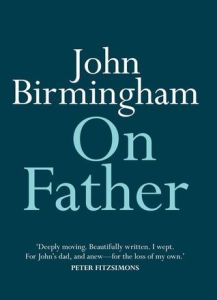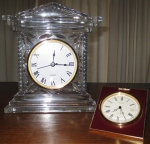 I wasn’t sure that I was ready to read On Father by John Birmingham. I saw it at the library and took it home, thinking that it might make an appropriate post for Father’s Day, upcoming in September. I hadn’t looked at the blurb; I had assumed the book would be some kind of homage to modern fatherhood, and I wondered whether it would ‘unman’ me to read it because I am still fragile about the loss of my father. Yes, I know, a strange verb to use, that one, ‘to unman’. All it means is for some circumstance to deprive a person of qualities traditionally associated with men, such as self-control or courage. But self-control and courage is hardly the sole prerogative of men, and there is no comparable word for women to use. ‘Unman’ is the one I need to convey the trepidation with which I opened this small book. I thought it might make me cry.
I wasn’t sure that I was ready to read On Father by John Birmingham. I saw it at the library and took it home, thinking that it might make an appropriate post for Father’s Day, upcoming in September. I hadn’t looked at the blurb; I had assumed the book would be some kind of homage to modern fatherhood, and I wondered whether it would ‘unman’ me to read it because I am still fragile about the loss of my father. Yes, I know, a strange verb to use, that one, ‘to unman’. All it means is for some circumstance to deprive a person of qualities traditionally associated with men, such as self-control or courage. But self-control and courage is hardly the sole prerogative of men, and there is no comparable word for women to use. ‘Unman’ is the one I need to convey the trepidation with which I opened this small book. I thought it might make me cry.
It turned out to be harder to read than I’d expected.
This is the blurb for On Father:
John Birmingham’s father died. And his life fell apart. The next six months were spent grinding through the dark forests of depression until he finally emerged out of the darkness onto sunlit upland. A unique yet universal story, ‘On Father’ reaches out to everyone who has experienced and survived deep grief.

Treasured clocks: the crystal one was given to me for my retirement.
I avoid books about grief. Some well-meaning person lent me a copy of C S Lewis’s A Grief Observed after the death of the only school friend I’d ever kept up with. It’s a bit of shock when someone of your own age dies, and Sue was only in her forties. I was very fond of her, and still cherish her memory, drinking my coffee out of her beautiful bone china mug and resisting all suggestions to reset the time on her small Seiko clock that graces my mantelpiece. But the book was useless, and I only read it to be polite.
So if Birmingham’s book had been titled On Grief as IMO it should have been, I would have left it where it was. But having brought it home, I tackled it, learning that Birmingham felt about his father, the way I felt about mine:
When a parent dies, for those left behind it can feel as though half of the sky has fallen. My father was the sheltering sky, and beneath his mild firmament no storm ever raged, no hard rain fell. His nature was as gentle as the fallen world is brutish. All of our lives, he was both a bastion against the trespasses of ill fate and the predations of the inimical. (p.1)
Idealised, of course. But if you can’t idealise your father, you are indeed bereft. And I write that fully aware that not everyone has a father they can love and admire and grieve for despite some human flaws, and I feel deeply for anyone who has not had that privilege.
Birmingham goes on to describe his father’s death, and then his own descent into a grief which became depression.
Grief is an ocean, fathomless and wide, and on the surface its most impelling forces arrive in waves. I was first inundated by a surge of howling grief a few hours later, when alone. (p.22)
It’s interesting that he can remember this, and go on to describe it at some length. I have no memory of the odd way that I behaved in the wake of my father’s death. I had parked the car and gone to the hairdresser, and then done some minor shopping. I went back to where I had parked my car, and it had vanished. I stood there in disbelief, and eventually made my way to the police station to report its theft. The policeman was taken aback too. A theft like that in broad daylight seemed highly unlikely in our law-abiding suburb … perhaps I had forgotten where I’d parked it? No, I was quite sure, because I’d needed a spot longer than the usual one-hour parking limit, and the few that there are, are localised to that street. He wrote it all down, and then I set off home on foot, only to be stopped short by a bizarre impulse to retrace my steps. And found myself staring at my car in the library car park. I must have got into the car and started off home and remembered the shopping and re-parked it. And I had no memory of this at all; all I remembered as I retraced my steps was my thinking about my father. When I returned in grave embarrassment to the policeman, he very kindly, very gently suggested that maybe I should see my doctor. I guess he thought I had dementia, but I now know that it was not an ‘ocean’ but a fog of grief.
What follows then is an almost scholarly dissection of ‘the literature’ on grief: Freud’s ‘Mourning and Melancholia”, and then the one we are all more likely to know about:
From mourning the loss of my father, I progressed quickly, quietly and with no conscious effort or awareness of the path on which I walked, to losing myself.
Freud, and generations of psychologists, psychiatrists, grief counsellors, and all the lesser mineworkers at the coalface of human sorrow, would say I had not completed my grief work. I had not moved through Kübler-Ross’s five stages of loss. As influential as was Freud’s half-baked paper, it was the book On Death and Dying by Elisabeth Kübler-Ross that would lodge in the modern imagination, like a fishbone in the throat, where it has remained for nearly fifty years; the definitive explanation for what’s going on with your feels. In the very first lines of Freud’s Trauer und Melancholie’, he admits that ‘the empirical material upon which this study is founded is insufficient for our needs’. No such admission ever tempered the appeal of Kübler-Ross’s neatly presented five-slices-of-sad-pizza. (p.30)
That’s a rather intemperate response to On Death and Dying and it reminds me of the anger that I felt when I read the C S Lewis book.
Which is to say, I think, that books about grief, including this one, are unlikely to help anyone through it when it strikes. They might be helpful in the abstract, or in the aftermath, but in the throes, the only thing that helps at all, is love.
Other books I have read in Melbourne University Press Little Books on Big Ideas series include:
- On Identity by Stan Grant.
- On Experience by David Malouf
- On Beauty by Susan Johnson
- On Rape by Germaine Greer
- On Patriotism by Paul Daley and
- On Fairness by Sally McManus.
Author: John Birmingham
Title: On Father
Publisher: Melbourne University Press, Little Books on Big Ideas series, 2019, 80 pages
ISBN: 9780522873429
Source: Kingston Library


I suspect this might have unmanned me too. My dad died in 2015 and it still stabs me when I least expect it.
LikeLiked by 1 person
By: kaggsysbookishramblings on August 18, 2019
at 5:24 am
All those things you wish you’d said…
LikeLiked by 1 person
By: Lisa Hill on August 18, 2019
at 8:32 am
I have been missing my dad a lot lately. He died in 2004. It pops up when you least expect it. I think that will always be part of my life. It’s good we had such good dads. That’s the down side of having good people in your life. So sad when they’re gone.
LikeLiked by 1 person
By: TravellinPenguin on August 18, 2019
at 9:25 am
Yes. You’re right, it is the downside, but one we’re lucky to have, I guess.
LikeLike
By: Lisa Hill on August 18, 2019
at 12:44 pm
Oh Lisa, your post had me in tears . . . never mind the book! I have floundered in that grief of an ocean (albeit not for a father) so my spirit is in sympathy with yours.
LikeLiked by 1 person
By: karenlee thompson on August 18, 2019
at 12:15 pm
Oh dear, I didn’t mean to make anyone cry!
But we do flounder, don’t we? And it’s so easy to fall back in.
LikeLiked by 1 person
By: Lisa Hill on August 18, 2019
at 12:48 pm
I’m sorry, Lisa, but I don’t agree with you. When my sister died in her thirties – such a devastating death that none of us will ever fully recover from – I sought everything I could to help the immense pain. (I can feel my breath shortening as I write this.) Family was wonderful (but they were suffering too), and I had a wonderful friend who listened and listened and listened so patiently, and I sought a group (which I couldn’t find), and I sought and read books about loss and grief. So, I think we are all different, and for some people books about grief can play a role in the process.
I remember hearing Birmingham speak about this – on the ABC probably, but I haven’t actually bought it or read it.
BTW Did you realise you can no longer click on pics to see bigger versions? I noticed this a little while ago and am not sure whether there’s something we can do about it. I wanted to get a better look at your lovely clocks, but couldn’t.
LikeLiked by 1 person
By: whisperinggums on August 18, 2019
at 7:26 pm
I didn’t know about your sister… that must indeed have been a terrible experience for all of you, and you would have been so young yourself too. Whatever ‘worked ‘ for you, I’m glad it did xo
Yes, I have noticed that about images. I’ve found that you can still do it with images on some old posts, so it’s rather odd, and very annoying.
LikeLike
By: Lisa Hill on August 18, 2019
at 7:54 pm
I don’t talk about it much. Over 30 years ago but still hard to write about, so thanks.
As for pics, yes I think there’s been a change somehow in how they are now loaded into WordPress or the posts, so those loaded the old way still work the old way. I haven’t researched it…
LikeLiked by 1 person
By: whisperinggums on August 18, 2019
at 8:11 pm
[…] On Father, by John Birmingham (Little Books on Big Ideas) […]
LikeLike
By: Nonfiction November – My Year in Nonfiction | ANZ LitLovers LitBlog on November 1, 2019
at 7:12 pm
[…] On Father, by John Birmingham […]
LikeLike
By: On Charlatans, by Chris Bowen | ANZ LitLovers LitBlog on May 21, 2021
at 9:14 pm